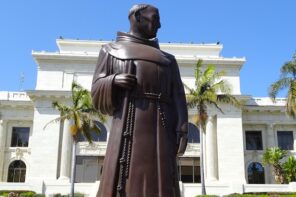Today, on the eve of the 31st anniversary of Oscar Romero’s assassination, President Barack Obama visited the archbishop’s tomb. Romero was of one of the most beloved, misunderstood, and critiqued figures in the modern Latin American Catholic Church and Obama’s visit has sparked some surprise and controversy—especially given Romero’s public critiques of the US government in the final years of his life and his association with Latin American liberation theology.
Often caricatured as Marxist, Oscar Romero was evangelized by the suffering of the poor of El Salvador who had been brutally targeted as insurgents by the death squads of the Salvadoran military. Initially Romero understood the Gospel as a message of peace and reconciliation, not social justice and liberation, which he saw as leading to conflict and threatening Church unity. After he was appointed archbishop in 1977, the repression of the rural poor escalated, and Romero was profoundly affected by their suffering. Romero came to see the preferential option for the poor as the defending of life itself. His sympathy toward the poor and oppressed grew, and he began to openly criticize injustice and violence. He saw the Church that encompasses the passion of Christ in the passion of oppressed peoples.
Most important in light of today’s visit, however, is Romero’s belief that Christianity is in its core political.
Obama’s visit to the tomb is being described as “extraordinary” by the Central American press, describing Romero as a Salvadoran martyr who was killed by the military. Roberto D’Aubuisson, the military officer who is suspected to have ordered Romero’s assassination, was trained in the United States and was permitted to observe US Special forces in action. D’Aubuisson is also the founder of ARENAS, the conservative political party that governed the country until 2009.
I did not anticipate that Obama would mention D’Aubuisson or the destabilizing role that the US government has played in Salvadoran history in particular and Central America as a whole—and he did not. Nor did I imagine (and again, I was correct) that he might highlight the fact that El Salvador’s current president, Mauricio Funes, is head of a coalitional government often described as central-left, whose membership includes the FMLN. The FMLN was the insurgent group that the United States, under the leadership of Ronald Reagan, spent billions trying to defeat. It is this US intervention that Romero so passionately and publicly critiqued.
The symbolism of Obama’s visit is profound. Romero is currently under review for beatification, a somewhat uneasy process given Romero’s association with liberation theology and Pope Benedict’s recently published book on Jesus that clearly states Jesus was not the revolutionary often described by political and revolutionary (a.k.a. liberation) theologies. While many are casting Obama’s tribute to Romero as a recognition of his activism on behalf of human rights, Romero himself would remind us that this is a political act.
I see Obama’s visit as symbolic of a shift in US attitudes toward Central America. Gone I hope is the era of intervention and manipulation. The Central America of today is different from the one that saw Romero’s blood shed while saying mass. Some would argue that the crisis of gangs and drugs that is engulfing this region is leading to a crisis that will eclipse the civil wars of the 1980s and 1990s. And yet in spite of the growing violence, figures like Romero give us hope.
As Romero prophetically stated, “I should tell you that, as a Christian, I don’t believe in death without resurrection. If they kill me, I will be resurrected in the Salvadoran people.” The Salvadoran people today, the Catholic Church as a whole, and all who stand as defenders of human rights and denounce injustice should take after Obama and spend a moment remembering this modern-day martyr who did not die in vain but whose dangerous memory continues to empower and inspire us today.




